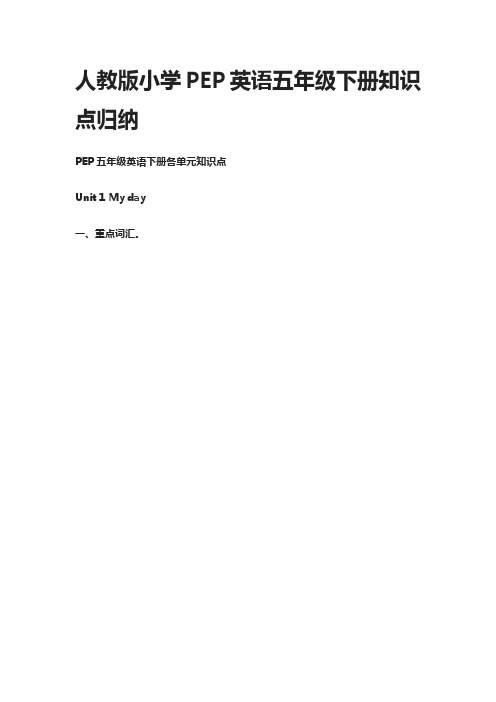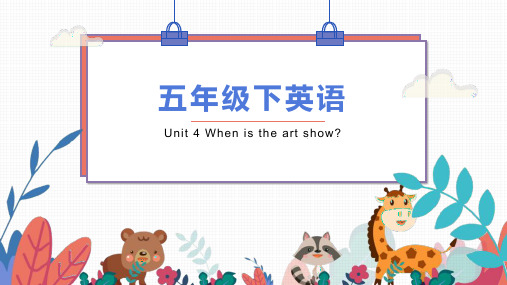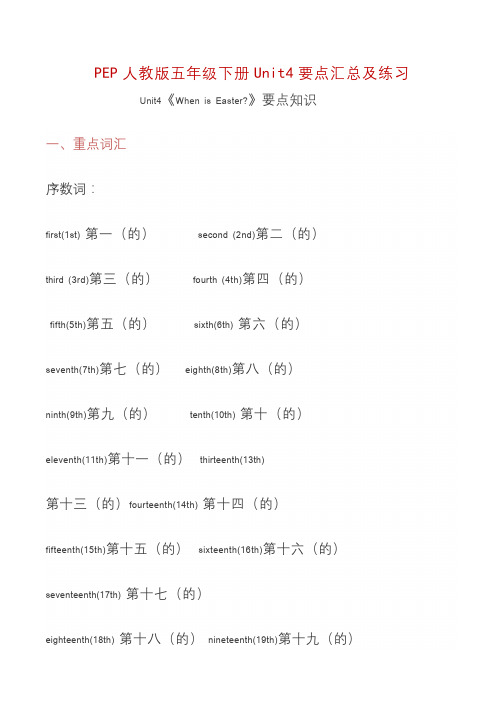PEP五年级下册四单元基础知识
五年级下册第四单元知识点总结

第四单元知识点总结一般现在时概念表示通常性、规律性、习惯性的状态或者动作。
结构主语+动词原形+其他(当主语为单三时动词要变成单三形式)一般现在时的时间标志often经常everday 每一天on Sundays 在每个星期天一般过去时概念:过去的某个时间里发生的动作或状态;过去习惯性、经常性的动作、行为。
一般过去时结构:①主语+was/were+其他He was happy yesterday. We were at school yesterday.②主语+动词过去式+其他He walked to the park yesterday.一般过去时的否定句结构①主语+wasn’t/ weren’t +其他He wasn’t happy yesterday. We weren’t at school yesterday.②主语+ didn’t +动词原形+其他He didn’t walk to the park yesterday.一般过去时的一般疑问句结构①Was/Were + 主语+ 其他?Was he happy yesterday?Were you at school yesterday?Yes,he was. Yes,we were.No,he wasn’t.No,we weren’t②Did +主语+动词原形+其他?Did he walk to the park yesterday?Yes,he did.No,he didn’t.动词过去式的规则变法:1.一般情况下直接在动词后加edlook →looked play →played walk →walked want →wanted2.动词末尾以不发音的e结尾直接加dlive →lived like →liked3.动词以辅音字母+y结尾变y为i加edstudy →studied cry →cried4.动词末尾以一个元音字母+辅音字母结尾并构成重读闭音节,要双写最后一个字母加ed。
小学英语人教版PEP五年级下册1-6单元知识点总结

Unit1 My day一、基本句型1.询问什么时候做某事:- When do you ……?你什么时候……?- I usually…at …. 我通常在…(点钟)…。
例:-When do you eat breakfast?-I eat breakfast at 7:00.2.What do you do on the weekend?你周末做什么?- I +频率副词+周末活动+时间。
或Sometimes I+周末活动例句:I sometimes go shopping with my mum on the weekend.(周末我时候和妈妈一起去购物)二、知识点:1.频率副词:always(总是,一直)>usually(通常)>often(经常)>sometimes(有时)2.只有Sometimes可以放在句首。
(Sometimes I cook dinner.)3.On the weekend 在周末on Saturdays 在周六on Sundays在周日(别忘加s)Unit2 My favourite season1.-Which season do you like best? (你最喜欢哪个季节?)Why?(为什么)-I like +季节+ best.(I like spring∕summer∕fall∕winter best) Because ___________.(因为)或:-What‘s your favourite season? -My favourite season is spring∕summer∕fall∕winter.2.-Why do you like winter best?(你为什么最喜欢冬天?) -Because______.二、知识点:1.leaf(树叶):复数leaves2.W,W真神奇,问出许多大问题。
what,what,问“什么”,when,when,问“时间”,where,where,问“哪里”,which,which,“哪一个”,why,why,“为什么”.Unit3 My school calendar补充:1.Dragon Boat Festival 龙舟节或端午节(农历五月五日)一般在阳历6月2.月份首字母大写。
五年级下册Unit4Unit6单元知识梳理及归纳(人教版PEP)

五年级下册Unit 4—Unit 6知识梳理及归纳(人教版PEP)Unit 4知识梳理[重点单词]1. first (1st) 第一(的)2. second (2nd) 第二(的)3. third (3rd) 第三(的)4. fourth (4th) 第四(的)5. fifth (5th) 第五(的)6. twelfth (12th) 第十二(的)7. twentieth (20th)第二十(的) 8. twentyfirst (21st)第二十一(的) 9. twentythird (23rd)第二十三(的) 10. thirtieth (30th) 第三十(的) [重点词组]1. art show 艺术节2. reading festival读书节3.May Day五一国际劳动节4. birthday party 生日派对5. make noises制造噪音[重点句子]1. There are some special days in May.在五月有一些特别的日子。
2. Thursday is his eleventh birthday.星期四是他十一岁的生日。
3. We can have a birthday party for both of you.我们会为你们两个举办生日派对。
4. They make noises when they are hungry.当他们饿的时候他们便制造噪音。
5. They can play with Robin.他们能跟罗宾玩耍了。
[重点对话]1.一What are they?它们是什么?一The school art show and the reading festival.学校艺术节和读书节。
2.一When is the art show?艺术节是哪天?一It’s on May 1st.它在5月1日。
3.一When is your birthday?你的生日是哪天?一My birthday is on June 4th.我的生日是6月4日。
人教版小学PEP英语五年级下册知识点归纳

人教版小学PEP英语五年级下册知识点归纳PEP五年级英语下册各单元知识点Unit 1 My day一、重点词汇。
五、重点句型。
1、询问别人什么时候做某事的句型及回答。
句型结构:问:When do you+动词短语原形+其他?(你/你们什么时候做某事?)答:I/We(+频度副词)+动词短语原形+at+具体时间(我/我们通常在几点做某事。
)例:问:When do you go to bed?(你什么时候上床睡觉?)答:I go to bed at 9:00p.m (我晚上9点上床睡觉。
)注意:当主语是第三人称单数(he,she,it,单个人名或单数名词)时,助动词do 要变成does,句型结构是:When does+主语(第三人称单数)+动词短语原形+其他?2、询问别人周末做什么的句型及回答。
句型结构:问:What do you do on theweekend?(你周末做什么?)答:I(+频度副词)+动词(短语)+其他。
例:问:What do you do on theweekend?(你周末做什么?)答:I usually read books. (我通常看书。
)注意:当主语是第三人称单数(he,she,it,单个人名或单数名词)时,助动词do 要变成does,句型结构是:What does+主语(第三人称单数)+do+on the weekend?六、四会句子:When do you finish class in the morning ? 你们上午的课到几点结束?We finish class at 1 o’clock . 我们一点钟结束上午的课。
What do you do on the weekend ? 你周末做什么?I often watch TV and play ping-pong with my father . 我经常看电视,也常和我爸爸一起打乒乓球。
七、语音:cl /kl/ clean clock class cleverpl /pl / plate eggplant please play Unit 2 My favourite season三、重点句型1、询问别人天气怎么样的句型及回答。
人教版五年级下册英语第四单元知识点

人教版五年级下册英语第四单元知识点
本文档旨在总结人教版五年级下册英语第四单元的重要知识点。
以下是对该单元的简明概述:
1. 单词:
- 包括生词和短语:xxx, xxx, xxx
- 单词的拼写、发音和意义
2. 句型:
- 各种类型的句子结构
- 重要句型的用法和例句
3. 语法:
- 该单元所涉及的语法点
- 各语法点的用法和示例
4. 文化知识:
- 与该单元内容相关的文化背景
- 地理、历史、俗等方面的知识
5. 阅读:
- 与该单元相关的阅读材料
- 阅读技巧和理解方法
6. 写作:
- 该单元所涉及的写作任务或要求
- 写作技巧和要点
以上是对人教版五年级下册英语第四单元知识点的简要总结。
通过仔细研究和掌握这些知识点,同学们将能够更好地理解和运用该单元的内容。
祝研究顺利!
(Note: The content above is a general outline for the document on the topic "Knowledge Points of Unit 4 in Grade 5 English Textbook (People's Education Edition)". It covers vocabulary, sentence patterns, grammar, cultural knowledge, reading, and writing aspects of the unit.)。
PEP小学英语五年级下册第四单元知识点归纳

适用精选文件资料分享PEP小学英五年下册第四元知点PEP小学英五年下册第四元知点第四元知点一、主要: draw pictures画画drawing pictures正在画画do the dishes洗碗碟doing the dishes正在洗碗碟 cook dinner做cooking dinner正在做 read a bookreading a book正在 answer the phone 接answering the phone正在接 listen to music听音listeningto music正在听音 wash clothes洗衣服washing clothes正在洗衣服 clean the room打房cleaningthe room正在打房 write a letter写信writing a letter正在写信 write an e-mail写子件 writing ane-mail正在写子件二、主要句子:1.This is Zhang Peng . (用)我是朋。
Who’s that? (用)你是哪位?What are you doing? 你正在干什么?2.I ’mdoing the dishes. 我正在洗碗碟。
I ’m reading a book。
我正在。
3.Grandpa is writing a letter 。
正在写信。
Brother is doing homework. 弟弟正在做作。
4.Mom is cooking dinner in the kitchen. 正在厨房里做。
5 .Dad is writing an e-mail in the study.爸爸正在房里写子件。
三、知点: 1 、在中介自己,可以用“ It’s ⋯”也许‘ This is⋯. ’。
但是不可以用“I am ⋯”也许“ My name is⋯” 2. 在中表另一个人接,:“ Can I speak to⋯?” 3 、告人接,: There is a call for you. 4、在接人稍候:Hold on please.也许 Please hold on. 5、在分(加ing )的:(1)一般状况下,在的后边直接加ing.如:play ―playing clean ―cleaning draw―drawing cook―cooking (2)以个不音的字母 e 尾的,去掉不音的字母 e,再加 ing . 如:write ―writing come ―coming take ―taking make ―makingleave ―leaving have―having (3) 以重音尾的,假如尾只有一个音字母,要先双写个音字母,再加ing.如:适用精选文件资料分享run ―running. swim―swimming set―setting put―putting sit―sitting plan―planning。
人教PEP五年级下英语unit 4知识点精讲

根据问句选答句
( E )1. What do you usually do on Mid-Autumn Day? A.My birthday is on April 4th.
对话练习三: A:When is your birthday? B: My birthday is on April 4th. A: That’s my mother’s birthday, too! B: Cool! What will you do for your mum? A: I’ll cook noodles for her. B: Chinese noodles are delicious. A: Please come then. We can have a birthday party for both of you.
A. twelfth
B. twelve
C. twelveth
( B ) 10. My brother is just 20. Today is his _______ birthday.
A. thirtieth
B. twentieth
C. twelfth
( A ) 11. ---When is your birthday? ---It’s on _______.
19
nineteen
20
twenty
40
forty
80
eighty
50
fifty
90
ninety
60
sixty
30
thirty
PEP人教版五年级下册Unit4要点汇总及练习

PEP人教版五年级下册Unit4要点汇总及练习Unit4《When is Easter?》要点知识一、重点词汇序数词:first(1st)第一(的)second(2nd)第二(的)third(3rd)第三(的)fourth(4th)第四(的)fifth(5th)第五(的)sixth(6th)第六(的)seventh(7th)第七(的)eighth(8th)第八(的)ninth(9th)第九(的)tenth(10th)第十(的)eleventh(11th)第十一(的)thirteenth(13th)第十三(的)fourteenth(14th)第十四(的)fifteenth(15th)第十五(的)sixteenth(16th)第十六(的)seventeenth(17th)第十七(的)eighteenth(18th)第十八(的)nineteenth(19th)第十九(的)twelfth(12th)第十二(的)twentieth(20th)第二十(的)twentieth-first(21st)第二十一(的)twentieth-second(22nd)第二十二(的)twentieth-third(23rd)第二十三(的)thirtieth(30th)第三十(的)二、用序数词表示具体的日期在英语中,“几月几日”可以先说“月”,再说“日”,其中“日”要用序数词,书写时序数词前可以有“the”,也可以没有。
但读日期时,the必须读出来。
如果要表示某年某月某日,通常按照“月、日、年”的顺序。
例如:March3rd读法是:March the third翻译是:3月3日。
June1st,2014读法是:Junethe first,two thousand and fourteen翻译是:2014年6月1日。
三、基数词变序数词的口诀记忆基变序有规律,结尾加上th;一二三特殊记,结尾各是t,d,d;八减t九去e,f来把ve替;y改为ie,结尾仍有th;若是遇到几十几,只变个位就可以。
